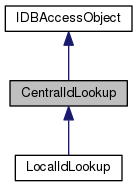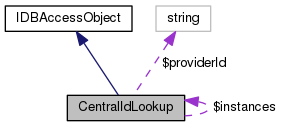The CentralIdLookup service allows for connecting local users with cluster-wide IDs. More...


Public Member Functions | |
| centralIdFromLocalUser (User $user, $audience=self::AUDIENCE_PUBLIC, $flags=self::READ_NORMAL) | |
| Given a local User object, return the central ID. More... | |
| centralIdFromName ($name, $audience=self::AUDIENCE_PUBLIC, $flags=self::READ_NORMAL) | |
| Given a (local) user name, return the central ID. More... | |
| getProviderId () | |
| isAttached (User $user, $wikiId=null) | |
| Check that a User is attached on the specified wiki. More... | |
| localUserFromCentralId ($id, $audience=self::AUDIENCE_PUBLIC, $flags=self::READ_NORMAL) | |
| Given a central user ID, return a local User object. More... | |
| lookupCentralIds (array $idToName, $audience=self::AUDIENCE_PUBLIC, $flags=self::READ_NORMAL) | |
| Given central user IDs, return the (local) user names. More... | |
| lookupUserNames (array $nameToId, $audience=self::AUDIENCE_PUBLIC, $flags=self::READ_NORMAL) | |
| Given (local) user names, return the central IDs. More... | |
| nameFromCentralId ($id, $audience=self::AUDIENCE_PUBLIC, $flags=self::READ_NORMAL) | |
| Given a central user ID, return the (local) user name. More... | |
Static Public Member Functions | |
| static | factory ($providerId=null) |
| Fetch a CentralIdLookup. More... | |
| static | resetCache () |
| Reset internal cache for unit testing. More... | |
Public Attributes | |
| const | AUDIENCE_PUBLIC = 1 |
| const | AUDIENCE_RAW = 2 |
 Public Attributes inherited from IDBAccessObject Public Attributes inherited from IDBAccessObject | |
| const | READ_LOCKING = 3 |
| Constants for object loading bitfield flags (higher => higher QoS) More... | |
| const | READ_NONE = -1 |
Protected Member Functions | |
| checkAudience ($audience) | |
| Check that the "audience" parameter is valid. More... | |
Private Attributes | |
| string | $providerId |
Static Private Attributes | |
| static CentralIdLookup[] | $instances = [] |
Detailed Description
The CentralIdLookup service allows for connecting local users with cluster-wide IDs.
- Since
- 1.27
Definition at line 29 of file CentralIdLookup.php.
Member Function Documentation
| CentralIdLookup::centralIdFromLocalUser | ( | User | $user, |
$audience = self::AUDIENCE_PUBLIC, |
|||
$flags = self::READ_NORMAL |
|||
| ) |
Given a local User object, return the central ID.
- Note
- Unlike centralIdFromName(), this does guarantee that the local user is attached to the central account.
- Parameters
-
User $user Local user int | User $audience One of the audience constants, or a specific user int $flags IDBAccessObject read flags
- Returns
- int User ID; 0 if the local user does not correspond to a central user, $audience lacks the rights needed to see it, or the central user isn't locally attached.
Definition at line 212 of file CentralIdLookup.php.
References $flags, centralIdFromName(), User\getName(), and isAttached().
| CentralIdLookup::centralIdFromName | ( | $name, | |
$audience = self::AUDIENCE_PUBLIC, |
|||
$flags = self::READ_NORMAL |
|||
| ) |
Given a (local) user name, return the central ID.
- Note
- There's no requirement that the user name actually exists locally, or if it does that it's actually attached to the central account.
- Parameters
-
string $name Canonicalized user name int | User $audience One of the audience constants, or a specific user int $flags IDBAccessObject read flags
- Returns
- int User ID; 0 if the name does not correspond to a user or $audience lacks the rights needed to see it.
Definition at line 170 of file CentralIdLookup.php.
References $flags, $name, and lookupUserNames().
Referenced by centralIdFromLocalUser().
|
protected |
Check that the "audience" parameter is valid.
- Parameters
-
int | User $audience One of the audience constants, or a specific user
- Returns
- User|null User to check against, or null if no checks are needed
- Exceptions
-
InvalidArgumentException
Definition at line 87 of file CentralIdLookup.php.
References User.
Referenced by LocalIdLookup\lookupCentralIds(), and LocalIdLookup\lookupUserNames().
|
static |
Fetch a CentralIdLookup.
- Parameters
-
string | null $providerId Provider ID from $wgCentralIdLookupProviders
- Returns
- CentralIdLookup|null
Definition at line 45 of file CentralIdLookup.php.
References $providerId, ObjectFactory\getObjectFromSpec(), and global.
Referenced by MediaWiki\Session\BotPasswordSessionProviderTest\addDBDataOnce(), SpecialBotPasswords\checkExecutePermissions(), ApiQueryUserInfo\getCentralUserInfo(), BotPassword\invalidateAllPasswordsForUser(), BotPassword\newFromUser(), BotPassword\newUnsaved(), BotPassword\removeAllPasswordsForUser(), ApiLoginTest\testBotPassword(), and CentralIdLookupTest\testFactory().
|
final |
Definition at line 77 of file CentralIdLookup.php.
References $providerId.
|
abstract |
Check that a User is attached on the specified wiki.
If unattached local accounts don't exist in your extension, this comes down to a check whether the central account exists at all and that $wikiId is using the same central database.
- Parameters
-
User $user string | null $wikiId Wiki to check attachment status. If null, check the current wiki.
- Returns
- bool
Referenced by centralIdFromLocalUser(), and localUserFromCentralId().
| CentralIdLookup::localUserFromCentralId | ( | $id, | |
$audience = self::AUDIENCE_PUBLIC, |
|||
$flags = self::READ_NORMAL |
|||
| ) |
Given a central user ID, return a local User object.
- Note
- Unlike nameFromCentralId(), this does guarantee that the local user exists and is attached to the central account.
- Parameters
-
int $id Central user ID int | User $audience One of the audience constants, or a specific user int $flags IDBAccessObject read flags
- Returns
- User|null Local user, or null if: $id doesn't correspond to a user, $audience lacks the rights needed to see the user, the user doesn't exist locally, or the user isn't locally attached.
Definition at line 188 of file CentralIdLookup.php.
References $flags, $name, $user, isAttached(), nameFromCentralId(), and User\newFromName().
|
abstract |
Given central user IDs, return the (local) user names.
- Note
- There's no requirement that the user names actually exist locally, or if they do that they're actually attached to the central account.
- Parameters
-
array $idToName Array with keys being central user IDs int | User $audience One of the audience constants, or a specific user int $flags IDBAccessObject read flags
- Returns
- array Copy of $idToName with values set to user names (or empty-string if the user exists but $audience lacks the rights needed to see it). IDs not corresponding to a user are unchanged.
Referenced by nameFromCentralId().
|
abstract |
Given (local) user names, return the central IDs.
- Note
- There's no requirement that the user names actually exist locally, or if they do that they're actually attached to the central account.
- Parameters
-
array $nameToId Array with keys being canonicalized user names int | User $audience One of the audience constants, or a specific user int $flags IDBAccessObject read flags
- Returns
- array Copy of $nameToId with values set to central IDs. Names not corresponding to a user (or $audience lacks the rights needed to see it) are unchanged.
Referenced by centralIdFromName().
| CentralIdLookup::nameFromCentralId | ( | $id, | |
$audience = self::AUDIENCE_PUBLIC, |
|||
$flags = self::READ_NORMAL |
|||
| ) |
Given a central user ID, return the (local) user name.
- Note
- There's no requirement that the user name actually exists locally, or if it does that it's actually attached to the central account.
- Parameters
-
int $id Central user ID int | User $audience One of the audience constants, or a specific user int $flags IDBAccessObject read flags
- Returns
- string|null User name, or empty string if $audience lacks the rights needed to see it, or null if $id doesn't correspond to a user
Definition at line 153 of file CentralIdLookup.php.
References $flags, and lookupCentralIds().
Referenced by localUserFromCentralId().
|
static |
Reset internal cache for unit testing.
Definition at line 70 of file CentralIdLookup.php.
Referenced by BotPasswordTest\setUp().
Member Data Documentation
|
staticprivate |
Definition at line 35 of file CentralIdLookup.php.
|
private |
Definition at line 38 of file CentralIdLookup.php.
Referenced by factory(), and getProviderId().
| const CentralIdLookup::AUDIENCE_PUBLIC = 1 |
Definition at line 31 of file CentralIdLookup.php.
Referenced by CentralIdLookupTest\testCheckAudience().
| const CentralIdLookup::AUDIENCE_RAW = 2 |
Definition at line 32 of file CentralIdLookup.php.
Referenced by BotPassword\invalidateAllPasswordsForUser(), BotPassword\newFromUser(), BotPassword\newUnsaved(), BotPassword\removeAllPasswordsForUser(), CentralIdLookupTest\testCentralIdFromLocalUser(), CentralIdLookupTest\testCentralIdFromName(), CentralIdLookupTest\testCheckAudience(), CentralIdLookupTest\testLocalUserFromCentralId(), LocalIdLookupTest\testLookupCentralIds(), LocalIdLookupTest\testLookupUserNames(), and CentralIdLookupTest\testNameFromCentralId().
The documentation for this class was generated from the following file:
- includes/user/CentralIdLookup.php
